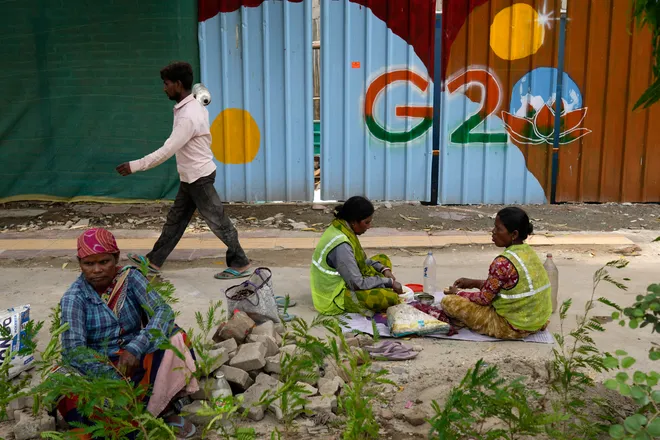I escaped modern slavery. Wouldn't you want to know if I made your shirt?
The footprint of modern slavery can be found all around us – if only we were made aware so that we could open eyes to the problem. The clothes we wear. The smartphones in our pockets. The solar panels on our buildings.
These and many other common goods often carry the taint of forced labor and modern slavery. Most people have no understanding that everyday goods are part of a supply chain that is touched by extreme exploitation. But the question is, if the world understood just how close we are to modern slavery, would this change the way we consume?
Unconscious consumer culture has long fueled the exploitation of some of the poorest and most vulnerable groups of society. Too often, international human rights laws are left ignored, while the need to cut costs for greater profits continually trumps all other business goals.
A new report sheds light on the surprising extent of the problem – and the culpability of some of the world’s richest nations. According to the 2023 Global Slavery Index by the human rights group Walk Free, nearly 50 million people are living in modern slavery. Millions of them are being exploited because of society’s desire for cheap goods.

The report shows that an annual $468 billion worth of goods imported into the Group of 20 industrial and emerging-market nations are at risk of being produced by forced labor. This includes nearly $150 billion worth of garments.
These colossal numbers might come as a surprise to some, but would knowing the human cost to our purchases change the way corporations and buyers behave? And what effect would this have on the environment?
As a child, I worked in illegal sweatshops in Nepal
If the latest data from the Global Slavery Index sounds impossible, consider that behind these numbers is a story like mine.
I fell prey to the massive organization of illegal sweatshops in the inner-city slums of Kathmandu, Nepal, and grew up in forced labor. Along with thousands of others, my childhood was traded for a life of suffering, malnourishment and industrial poisoning on a scale unimaginable to the average consumer.

So ask yourself now, if the next time you were browsing a department store, picking your summer outfit and the tag told you that this garment was made using modern slavery, would you still make the purchase? Would this make you reflect on how you may be consuming the suffering of a child or hurting our planet?
'Sound of Freedom' is a box office hit.But does it profit off trafficking survivors?
As a child, I worked 12-15 hours a day in a textile sweatshop, receiving less than the equivalent of $2 per agonizing and traumatizing shift – but only if I completed the hundreds of garments demanded of me. Most of the time, the sweatshop owner paid no one, closed up shop and moved on to his next group. I ate, slept and worked my little fingers raw, in a workstation the size of a prison cell.
Even then, I knew in my heart that people would not choose to purchase these items if they truly understood where they came from and how they were made. That is why an economic system built on transparency is desperately needed on a global scale.
After breaking free from my exploitation, I came to the United States and visited a large chain store for the first time. I walked the aisles in disbelief – I had never experienced this level of both luxury and convenience. It was horrifying to see – but also a great revelation to recognize the exploitation and abject poverty attached to these products. Seeing in my memory the ghostly faces of children like me, scattered into the thousands of products around me, brought me to tears.
Supply chains need transparency on working conditions
Businesses have increasingly complex global supply chains that lack transparency of who is working where and under what conditions. Too often, this works to the corporations' advantage. By failing to meaningfully engage with modern slavery risks, businesses can turn a blind eye, avoid remediation and continue to place profits over people.
The sad fact for most companies is that if they look hard enough for worker exploitation – or if they even look at all – they will find it. Supply chain transparency should be built into business operations as standard, to guarantee that products have been made under fair conditions that uphold ethics and human rights.
Ashley Judd:Americans thought child labor was a travesty 'over there.' That myth has been shattered.
While businesses should willingly take on the responsibility to ensure that their supply chains are free of modern slavery, governments also have a role to hold them to account and to set a level playing field for our global economy. This role includes ensuring businesses and governments are actively looking for forced labor in supply chains.
While some governments around the world are stepping up, there remain serious gaps in legislation that businesses can exploit. For example, research by Walk Free finds that most companies are falling at the first hurdle when it comes to even reporting on the actions they are taking. Governments must establish sound policies that do not allow businesses to exploit the massive loopholes that exist in legislation.
The result of the current system is decades of corporate social responsibility that is merely voluntary, modern slavery reporting legislation with no consequence for noncompliance, and greenwashing campaigns that could convince the savviest of consumers that they are acting ethically.
The development of policy to address modern slavery will always be impeded as long as it ignores how the issues are deeply intersected with wider structures, systems and behaviors. Focusing on issues in silos will hold us back from solutions for decades to come.
Modern slavery thrives in the shadows and darkness, the unspoken truth, the hidden parts of our global society too ugly or horrific to witness in light. But truth is the key.

We need radical supply chain transparency and nonnegotiable, meaningful engagement from all businesses and corporations. We need modern slavery legislation that imposes the duty to protect all workers in supply chains and ensures the protection of our planet. We need to hold companies liable for breaches and inaction, leaving no one behind in the pursuit of a thriving global economy.
With 50 million people living in modern slavery around the world, the time for meaningful action and renewed commitment is now. If not addressed immediately, the next Global Slavery Index will record an exponential growth of exploitation built on the backs of child laborers like myself, against a backdrop of a culture of ignorance in the face of suffering.
Wouldn’t you want to know if I made the very shirt on your back?
Nasreen Sheikh, survivor leader and international human rights advocate, is the founder of Empowerment Collective and Local Women’s Handicraft.
Disclaimer: The copyright of this article belongs to the original author. Reposting this article is solely for the purpose of information dissemination and does not constitute any investment advice. If there is any infringement, please contact us immediately. We will make corrections or deletions as necessary. Thank you.







